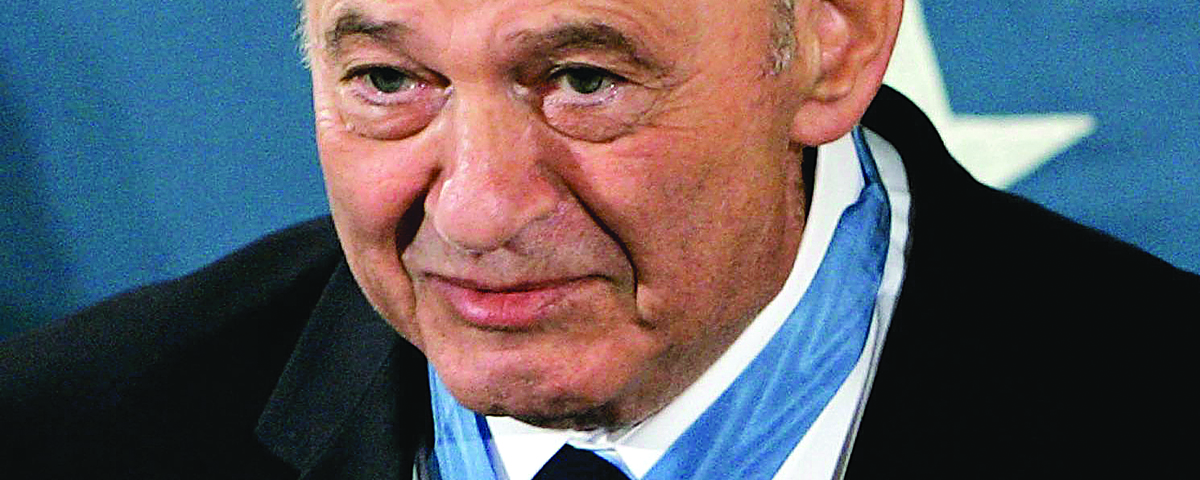When President George W. Bush draped the Medal of Honor around Tibor Rubin’s neck on Sept. 23, 2005, it was in recognition of the Holocaust survivor’s heroism and sacrifice more than a half-century earlier.
Born in Paszto, Hungary, on June 18, 1929, Rubin was 13 when the Nazis sent him to a concentration camp in Austria. Though the Holocaust claimed both parents and two of his three sisters, Ted survived 14 months in captivity before the U.S. Third Army liberated the camp.
In 1948 Rubin immigrated to the United States to fulfill a promise. “If the Lord helped me go to America,” he’d vowed, “I’d join the Army.” He enlisted in 1950 and that July shipped out to Korea as part of Company I, 8th Regiment, 1st Cavalry Division. On the front lines his anti-Semitic master sergeant, Arthur Peyton,“volunteered” the private for the most dangerous missions. Yet Rubin demonstrated extraordinary bravery in combat, and two of his commanders recommended him for the Medal of Honor. But when both were subsequently killed, Peyton discarded the paperwork.
During his last action, at Unsan, North Korea, in October 1950, Rubin singlehandedly covered his regiment’s retreat against a massive Chinese assault, manning a machine gun until the ammunition ran out. He was wounded and taken prisoner. Employing techniques he’d learned while a Nazi captive, such as stealing food and medicine or using maggots to treat gangrenous wounds, Rubin performed good deeds on behalf of his fellow POWs. He was held until released in an April 20, 1953, prisoner exchange. Although sick and weak, he claimed that Chinese treatment, harsh as it was, was a cakewalk compared to the German concentration camp.
After his discharge Rubin gained U.S. citizenship and settled in California. In 2002 Bush ordered a review of Jewish veterans’ records, and the Army determined that Rubin, on the basis of his religion, had been denied the nation’s highest military award. Congress authorized the medal. Rubin’s citation read:
While his unit was retreating to the Pusan Perimeter, [Rubin] was assigned to stay behind to keep open the Taegu-Pusan road link used by his withdrawing unit. During the ensuing battle overwhelming numbers of North Korean troops assaulted a hill defended solely by [Rubin]. He inflicted a staggering number of casualties on the attacking force during his personal 24-hour battle, single-handedly slowing the enemy advance and allowing the 8th Cavalry Regiment to complete its withdrawal successfully.…
On Oct. 30, 1950, Chinese forces attacked his unit at Unsan, North Korea, during a massive nighttime assault. That night and throughout the next day he manned a .30 caliber machine gun at the south end of the unit’s line after three gunners became casualties. He continued to man his [weapon] until his ammunition was exhausted.…[Rubin] was severely wounded and captured by the Chinese.
Choosing to remain in the prison camp despite offers from the Chinese to return him to his native Hungary, [Rubin] disregarded his own personal safety and immediately began sneaking out of the camp at night in search of food for his comrades.…Rubin provided not only food to the starving soldiers, but also desperately needed medical care and moral support for the sick and wounded of the POW camp. His brave, selfless efforts were directly attributed to saving the lives of as many as 40 of his fellow prisoners.
Tibor “Ted” Rubin—the only Holocaust survivor to have earned the Medal of Honor—died at age 86 in Garden Grove, Calif., on Dec. 5, 2015.
First published in Military History Magazine’s May 2017 issue.





